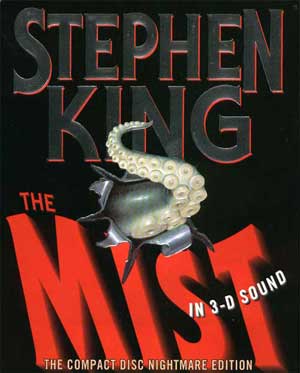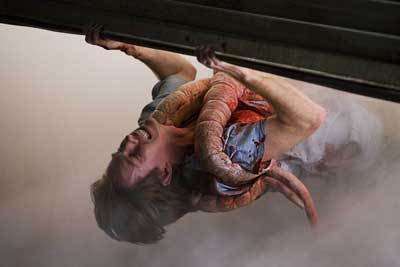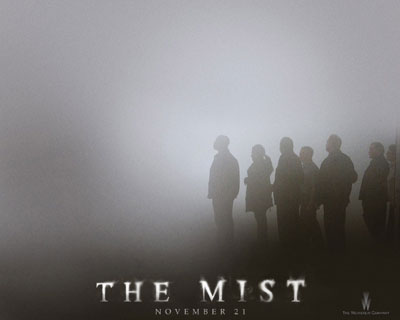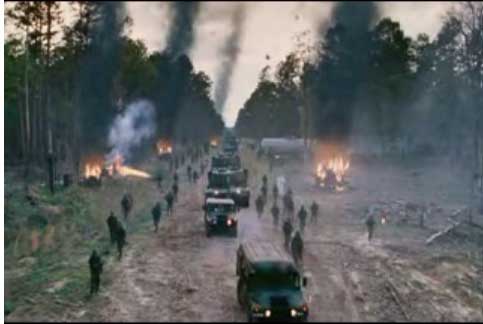 I can’t resist a Stepehen King film adaptation, it is one of my great weaknesses and has accounted for many wasted hours in my life. I had already voiced my excitement about Frank Darabont’s film adaptation of Stephen King’s novella The Mist, which was a particularly special for me because it was one of my favorite King stories, which says a lot because I think he has written some great shorter stuff in the 70s and early 80s. So after seeing The Mist last week, I was planning on letting it go and sparing everyone but Anto my rant. At least until Scott Leslie’s comment here brought up an interesting trend in recent movies that is really beginning to annoy me, in directly providing the occasion to vent I was looking secretly looking for
I can’t resist a Stepehen King film adaptation, it is one of my great weaknesses and has accounted for many wasted hours in my life. I had already voiced my excitement about Frank Darabont’s film adaptation of Stephen King’s novella The Mist, which was a particularly special for me because it was one of my favorite King stories, which says a lot because I think he has written some great shorter stuff in the 70s and early 80s. So after seeing The Mist last week, I was planning on letting it go and sparing everyone but Anto my rant. At least until Scott Leslie’s comment here brought up an interesting trend in recent movies that is really beginning to annoy me, in directly providing the occasion to vent I was looking secretly looking for
And while in the end I had major issues with the adaptation, the first hour and a half of the movie was pretty enjoyable. It was a relatively solid b-movie adaptation of the story with sub-par acting, under-developed characters, and a solid monster plot to make it engaging. I liked the scene in the back of the grocery store when the bag boy gets ripped apart by the horrific tentacled monster. I also enjoyed the whole idea of people hauntingly disappearing into the mist never to be seen again, or the huge bugs on the plate glass windows of the grocery store, or even the factions that emerge amongst the terrified refugees of the grocery store. And while underwhelmed by the scene where a band of heroes brave it to the pharmacy-cum-spider-lair next door to the grocery to get medicine for an injured compatriot, I still watched it greedily. All these scenes invoked the vivid pictures in my mind I had drawn twenty some-odd years ago when I first read the story (though by no means more powerful as Kubrick’s version of The Shining proved to be).

So what’s my problem and what the hell does Scott Leslie’s comment have to do with any of this? Good question, I’m getting to that. My problem is that the film was doing a pretty good job of knowing its limitations and reflecting a solid, but by no means great, b-quality adaptation of a very good pulp horror story. I wouldn’t write home about the adaptation, but I might have recommend it to like-minded maniacs. At least up and until the last five minutes of the film, which absolutely drove me crazy. If you are familiar with the novella, you might recall that King outlines some potential endings for this apocalyptic monster tale through his main character of his story:
But you mustn’t expect some neat conclusion. There is no And they escaped from the mist ino the good sunshine of a new day; or When we awoke the National Guard had finally arrived; or even the old standby: it was all a dream.
It is, I suppose, what my father always frowningly called “an Alfred Hitchcock ending,” by which he meant a conclusion in ambiguity that allowed the reader or viewer to make up his own mind about how things ended. My father had nothing but contempt for such stories, saying they were “cheap shots.” (pg 132 of the First edition of Skeleton Crew -which I own 🙂 )
And, in fact, that is how the story ends, in a certain amount of gray ambiguity, very much in line with the imaginative power of the story. The very questions of what happened with the Arrowhead Project to create such monstrosities, as well as the characters quick regression into fear and violence marked moments of strange uncertainty and troubling ambiguity that worked powerfully on my imagination decades ago.  So much so, that when I first read Benito Cereno in undergrad The Mist was the first story I thought about during Melville’s magical gray-filled opening garnished with the impenetrable fog weighing down on the reader like a dew-filled mist of uncertainty and misapprehension, all of which beautifully frames that underlying themes throughout the narrative. And while King is admittedly no Melville for descriptive power, allegory, and literary allusion, I do think the comparison marks a shared sense of craft between the two which values the powerful realm of the readers imagination.
So much so, that when I first read Benito Cereno in undergrad The Mist was the first story I thought about during Melville’s magical gray-filled opening garnished with the impenetrable fog weighing down on the reader like a dew-filled mist of uncertainty and misapprehension, all of which beautifully frames that underlying themes throughout the narrative. And while King is admittedly no Melville for descriptive power, allegory, and literary allusion, I do think the comparison marks a shared sense of craft between the two which values the powerful realm of the readers imagination.
Darabont’s version of The Mist goes explicitly out of its way to break this rule in an attempt to invoke the “hopeless horror that is life” for some cheap allegory about the current War in Iraq, a trend in Hollywood as of late. And because they need to fill up the special features on DVD nowadays, there are two versions of the ending available for this film —as if one wasn’t bad enough. They both suck, but the version they actually decided on makes my point that much clearer, take a look:
Original ending:
Alternate ending:
What both of these endings illustrate is the terrible realization on the part of the filmmaker that his confused political commentary—lacking all subtlety–has failed. And rather than writing it off as a lost cause given the lack of any art, the final scene becomes a hammer with which to assault the viewer with the message, in this case how much this story is in fact “an allegory” for the War in Iraq. The final minute features a wide shot of a war torn landscape, replete with Desert Storm Hummers, military transports for refugees, imposing tanks, flame throwers, all which tries to suggest what exactly? That the war in Iraq is horrible? Thanks for that obvious public service announcement! That the military lies and is bad? Hmmm, about as facile as saying they’re good and honest. That you, the viewer, are an idiot and need to be punched in the face with a point because they dislike you so vehemently? I guess the latter works best.

So not only does the original ending feature one of the most unnecessary moments of desperation that has the main character murdering everyone in the car because there “is no hope,” only to realize the National Guard has arrived and is gaining the upper hand in the war against the monsters. But it is all too late, right? He is a tragic figure that reflects the horror of our moment, right? But why? Why are these filmmakers, like with No Country for Old Men, so transfixed with the lack of hope and promise? Which finally brings me to Scott Leslie’s point in the comment that I’ll reproduce here:
I’m not arguing that it’s a film *about* the war in Iraq, but I had the distinct sense while watching the film that its makers were painfully aware of not just the war but larger global concerns, that its bleakness was, if not a reaction to, somehow influenced by.
The fact that these films are reacting with in the cultural moment, and our predominant filmic response is “all hope is lost” makes me kind of cringe, and wonder how much, for me, is what rings so cheap about both these films, though obviously different for their technical artistry, they each seem hollow as larger commentaries on our “historical moment.” They are too caught up in being relevant and timely, making them terribly forced and disingenuous. And this isn’t to say it hasn’t been done effectively in the past, just thing of films like High Noon, Dr. Strangelove, Night of the Living Dead, and the list goes on and on.
I prefer the ending of the actual story far more:
I’m going to bed now. But first I’m going to kiss my son and whisper two words in his ear. Against the dreams that might come, you know.
Two words that sound a lot alike.
One of them is Hartford.
The other is hope.


Jim, a v. thoughtful post. I think, particularly with horror, that the horror has to come first, never the ‘message’. I see you’ve been watching ‘Dawn of the Dead’ which is an excellent example of this. It can be read as an attack on commercialism, but it never forgets to be an excellent zombie film (the best zombie film in fact).
Nabakov captures this well when he says “Nothing is more boring or more unfair to the author than starting to read, say, Madame Bovary, with the preconceived notion that is a denunciation of the bourgeoisie…we shoul study that new world… having no obvious connection with the worlds we already know. When this new world has been closely studied, then and only then let us examine its links with other worlds’
Having said that, I don’t mind bleak ‘there’s no hope’ kinda movies.
BTW – have you seen the remake of Dawn of the Dead? While not a touch on the original it has the marvellous innovation of fast moving zombies. It sort of works.
Martin,
That quote by Nabakov says it perfectly, and that is why I returned to Dawn of the Dead. For that is definitely in the formative top 10 —it will actually be the first post thanks to this post and thread— and I agree with you entirely: Dawn of the Dead it is first and foremost a great zombie movie. It affected me deeply as an adolescent when I saw it for the first time,and even after innmuerable viewings I find myself covering my eyes at certain scnes, and experiencing the original dread I had in the late 70s, early 80s. Not until after numerous additional viewings and the cult community around it does the critique of consumerism link it with other worlds, namely the mall culture that was beginning to boom at the time. And the attack on consumerism you discuss is such a beautifully woven in thema that it always elevates this film for me to the next level, like its predecessor Night of the Living Dead.
As far as hope, I’m glad you called me on this, because I think I am starting to sound like I need a good happy ending to make the film remotely valuable, which isn;t true. In fact, I love good apocalyptic end-of-the-world film as much as the next guy, what irks me though is the way in which the push towards complete nihilism and hopelessness, is rarely backed up with anything resembling a compelling series of events that might frame its complexity for the view, and this goes for NCFOM as well.
I don’t necessarily judge a film on how hopeless it is or isn’t, but rather th way in which the narrative frames this condition as an interesting, complex, and entertaining way. I think the Dawn of the Dead ending is interesting in this regard because while Romero seems to toy with the end of everything, it ultimately ends on a seemingly hopeless scene that at least leaves possibilities to the imagination, this is rarely the case with more recently. The hopelessness seems =more a narrative and political cop out more than anything else.
How fun is it to talk horror films with you, very cool!
Let’s give up work and talk horror movies Jim.
I think the thing about bleakness is that it is, as you say, something of a cop-out. That’s because hope, happiness, niceness even is very difficult to portray in anything but a sentimental fashion. You get more art kudos for being miserable. ‘Happiness writes white’ as the saying goes. You see this is music too. Now I am of a melancholic bent, so my favourite bands are people like the Smiths and Radiohead, who seem genuinely dark (although in Morrissey’s case with genuine humour too). But I can’t stand pseudo-miserable e.g. Coldplay because it seems contrived. I wonder if this is similar to your aversion to NCFOM?
Back to film. I’m not sure I have a top ten of your sub-genre of 1980s B-movies, but here are some of the films that were influential to me in that era, and vaguely fit into that category (so, ignoring other influential films such as Taxi Driver). These could broadly be labelled ‘films I used to bunk off school to watch’:
Dawn of the Dead
The Evil Dead (1 or 2, probably 2 on balance)
The Warriors (bit big budget but the first film I saw on video)
Scanners (I loved Cronenburg sci-fi)
The Thing
Texas Chainsaw Massacre (bit earlier I know, but it was the first time I understood what the camera angle could do)
Robocop (okay, definitely big budget, but probably marked the culmination of these type of films)
Scum (not horror, but had b-movie feel to it)
Martin,
That is a great list, and could easily be my own. The Warriors is an amazing film, possibly one of the greatest NY urban jungle movies, it ranks right up there with The Taking of Pelham 123. Scanners is also a masterpiece, and it was the first movie that I can recall that actually visualized the internet via telephone. A wild scene.
This discussion has actually prompted me to marry my obsession with film with approaches to imagining it differently when “learning about it.” I am in the process of following your prompt here, and using the argumentative edit, commentary and mashup to re-imagine ways to commune and create with these cultural artifacts of our imaginative past. What is amazing about all the films you list, is how much they not only evoke a time and place for me personally, but an entire film world that is beautifully compelling in its texture and depth. Dawn of the Dead and the Warriors maybe the two best examples of this, though Texas Chainsaw Massacre and the Thing certainly offer the horror of closed, isolated spaces that ultimately become hermetically sealed worlds of fear.
Great list, I would be proud to call it my own,. Seems like our tastes in good bad cinema are extremely close, and I now have to add Scum to my list of movies. Thanks for that.